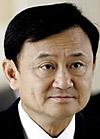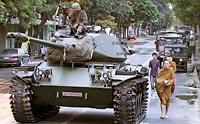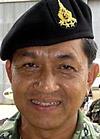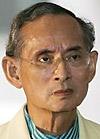Thai army ousts prime minister

BANGKOK, Thailand — Thai army leaders deposed Prime Minister Thaksin Shinawatra, a longtime ally of President Bush, using tanks and soldiers to seize the capital Tuesday night without firing a shot. The coup was the first in 15 years in a country where many people believed that military seizures of power were a thing of the past.
Thaksin was in New York, attending the opening of the U.N. General Assembly, when soldiers surrounded Government House, his office, at about 10:30 p.m. He declared a state of emergency by telephone, but his announcement, carried on television, was cut off midway and had no discernible effect as army units seized key facilities in a light rain.
Retired Lt. Gen. Prapart Sakuntanak, a spokesman for coup organizers, addressed a stunned nation on television, explaining that the revolt was necessary because Thaksin's government had divided the country and corruption was rampant.
He said Thailand's constitution and government were suspended and replaced by military law. But he assured the country's 63 million residents that the seizure would be temporary and power would be "returned to the people" soon.
Thaksin, a billionaire businessman and former police officer who has led Thailand for more than five years, canceled a planned address to the General Assembly and remained secluded in a New York hotel. Bush has made the spread of democratic rule abroad a key theme of his administration. It remained unclear what response the U.S. government would give to the overthrow of an elected figure described by Bush in 2003 as a "very capable leader." In recent months, White House officials have been distancing themselves from Thaksin, who was embroiled in a corruption scandal.
In Thailand, announcements on state-run television signed by the coup leader, Gen. Sondhi Boonyaratkalin, commander in chief of the army, said that martial law had been declared across Thailand and that the 1997 constitution had been revoked. A holiday was declared for today.
Thaksin, a former senior police official who built a fortune in the telecommunications industry, has faced street protests for much of the year over allegations of corruption, abuse of power and a bungling response to a Muslim insurgency in the southern part of the predominantly Buddhist country. Many military officers contended he was trying to interfere with promotions and postings in the armed forces.
Opponents of the prime minister cheered the coup; some of them turned out in the early morning to greet soldiers sitting atop tanks parked on Bangkok streets. Thaksin is widely popular in rural Thailand, where most of the population lives, and there was little immediate response from those communities.
Sondhi and other coup leaders are close to Thailand's deeply revered King Bhumibol Adulyadej. What role, if any, the monarch played in the takeover was unknown. Some of the coup soldiers sported bands of yellow, the royal color, on their arms and gun barrels in an attempt to signal they were acting in support of the king.
In the early morning hours, the king, who has reigned for nearly 60 years and is the world's longest-reigning monarch, appeared on Thai television with Sondhi in what was considered a show of his unquestioned support for the overthrow. In past political crises, a few words from the king have dramatically turned the course of events.
Panitan Wattanayagorn, a political scientist, said he had been fearful in the initial hours of uncertainty that troops loyal to Thaksin might fight back. But concerns of bloodshed subsided as no such opposition appeared. As the sun rose today, the city was quiet.
Army TV gave the first sign that something was afoot when it began broadcasting patriotic songs and images of the king.
An announcer said the reasons for the coup d'état lay in the deep divisions that had been created over the past year.
Thaksin and his Thais Love Thais party won a resounding victory in 2005 elections, securing 374 of 500 seats in the House of Representatives. But he soon found himself in a political crisis.
Street protests that had begun with a murmur late last year found voice in January after Thaksin's family sold its shares in the telecommunications and satellite company, Shin Corp., to Singapore's Temasak Holdings for $1.9 billion, tax-free.
Throughout his time in office, the gregarious prime minister enjoyed strong support from rural and middle-class voters, who rallied behind such economic programs as low-interest loans and inexpensive health care.
But opposition to his rule had grown among educated urban voters amid allegations that Thaksin had abused his position to enrich himself and his family.
Thaksin sought to counter demands for his resignation by calling early elections in April, only to see them boycotted by the opposition parties. Eventually, King Bhumibol called on the courts to "clear up the mess" and the judges nullified the vote.
Sen. Kraisak Choonhavan, whose late father, Gen. Chatichai Choonhavan, was ousted as prime minister in the last successful coup in 1991, said the new takeover was "unfortunate ... but it seems as if it was inevitable. And I think the key to understanding in this event is probably Mr. Thaksin wants to take out the existing military hierarchy altogether and put his men in and have total control of Thailand."
Thaksin had been hoping that a recent military reshuffle and series of promotions would strengthen his hand, analysts said.
The coup is the 18th successful or attempted military takeover in Thailand since the country became a constitutional monarchy in 1932. But in the 1990s, the military stepped back from this role as democratic institutions began to take root in the country.
An official U.S. determination that a coup has occurred could trigger a suspension of U.S. military assistance to Thailand, including training of military personnel and sales of equipment, a U.S. official said.
Among the initiatives that may be jeopardized is a U.S. effort to help ramp up Thailand's surveillance capabilities, particularly in the Malacca Straits, a vital shipping channel, said the official, speaking on condition of anonymity.
The U.S. has faced similar situations with past coups in Indonesia, Cambodia and throughout Africa.
Additional information from Los Angeles Times and Bloomberg News



Key players![]()
![]()
Prime Minister
Thaksin Shinawatra
The 56-year-old former policeman from the northern city of Chiang Mai, who was ousted on Tuesday, was popular with the rural masses. After studying criminal justice in the U.S., he taught at the Thai Police Cadet Academy and went into business selling electronic hardware to the police force. The business became a telecom conglomerate that would later become the focus of a tax scandal when relatives sold their shares. His 2003 war on drugs boosted his image, but the deaths of 2,500 people outraged human-rights groups.
Gen. Sondhi
Boonyaratkalin
The first Muslim army commander in Buddhist-dominated Thailand, this Vietnam War veteran who took power Tuesday had been appointed to the army's top post last year with a mission to deal with an Islamic insurgency in the country's south. He is thought to be close to Thailand's revered monarch, King Bhumibol Adulyadej.
King Bhumibol
Adulyadej
The king, 79, recently celebrated his 60th anniversary of assuming the throne. He is the world's longest-reigning monarch. In April, after a disputed election failed to produce a parliament, he called it "undemocratic" and it was annulled, and the crisis defused. Born in Cambridge, Mass., the saxophone-playing king has been revered since the military government turned to the monarchy as a unifying force in the '50s.
Reuters, The Associated Press, Los Angeles Times